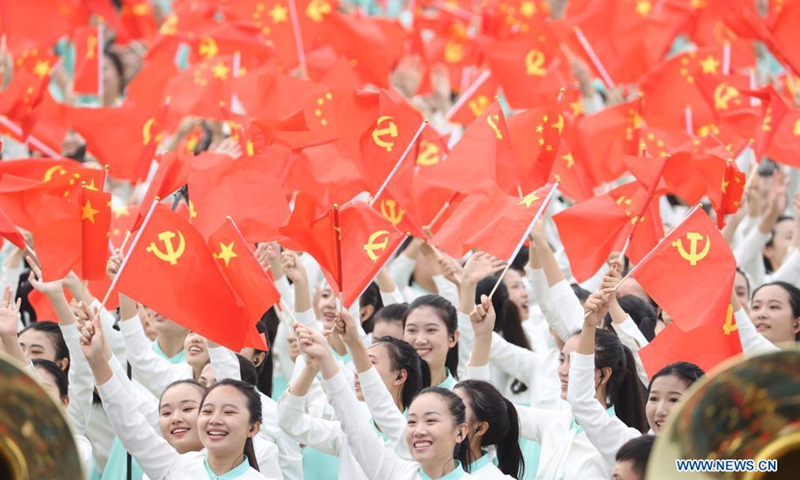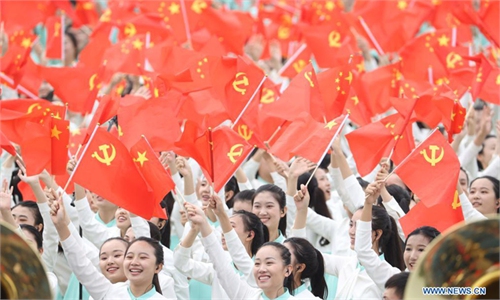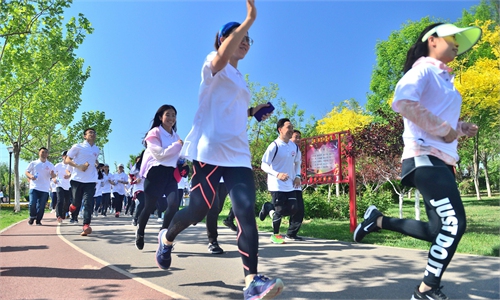
A ceremony marking the centenary of the Communist Party of China (CPC) is held at Tian'anmen Square in Beijing, capital of China, July 1, 2021.Photo:Xinhua
Editors Note:
May 4 marks the Youth Day in China. Year 2022 also marks the 100th anniversary of the founding of the Communist Youth League of China. This generation of Chinese youth not only have more opportunities than their predecessors, but have interacted more with their peers elsewhere across the world. For this reason, their confidence and faith will have a profound influence around the world. The Global Times has invited several international observers to comment on their impression of this generation of Chinese youth. This is the second in the series.
Chinas Youth Day is coming up on Wednesday and there are certainly many indicators that the countrys youth are in a good place. Poll after poll indicates that a wide majority of young people believe their country is headed in the right direction, and the general population continues to show high levels of government trust and satisfaction.
I am not Chinese, so I cannot speak about the actual experience of being a young person in China. What is clear, however, is that Chinas economic miracle continues to bring generalized prosperity to the Chinese people and provide opportunities to young people.
Recently, I wrote a column about US teenagers and why they are reporting the highest levels of depression on record. I analyzed four primary drivers, namely social-media use, a decline in sociality, stressors in the world (and news about it) and modern parenting strategies, and also noted how government policy fuels these drivers.
When one looks at China, it becomes clear that these stressors are absent or at least improving, meanwhile the Chinese government has enacted policies on each of these issues.
Looking at social media use, we can see a clear difference in how China tackles this issue. Whereas US platforms are pretty much unshackled, allowed to aggressively program algorithms to hook peoples attention and spread disinformation, Chinas are far different.
Heres an example. In August 2021, Chinas cyberspace watchdog, the Cyberspace Administration of China (CAC), published a set of draft regulations for recommendation algorithms. They are, in my opinion, now the gold standard in the world and far surpassing those of Chinas peers, such as the European Union and its General Data Protection Regulation (GDPR).
The regulations specifically provide users a convenient way to view and delete keywords that algorithms profile them with. It also regulates the range of keywords that algorithms can use. They also focus on civil society concerns, for example, overconsumption, monopolistic behavior, inappropriate content for children, as well as discrimination and unfair working conditions (for example, with ride-hailing or delivery services).
Sociality is being addressed in a downstream way thanks to these regulations, helping people stay off their phones and connect more in real life as a result. But when we compare other ways that young Chinese people are able to socialize easier, for example, when compared to their US peers, the ongoing COVID-19 pandemic is an obvious factor. Its true that major Chinese cities are now seeing cases flare up, but it is nowhere comparable to the near-constant restrictions in the US over the past years.
In general, Chinas housing and zoning policies are more favorable to socialization and community. The US stands alone as a very anti-social country thanks to its suburban configuration and the widespread use of automobiles. On the contrary, much like most of the world, China has walkable cities and accessible transportation - though, in Chinas case, these are of exceptional quality and convenience.
On global stressors, sure, China is struggling with climate change and the threat of global conflict just like every other country. But China's dynamism and growing influence in the world infuses young people with a certain optimism that you dont find in other places like the US.
Mark Fishers famous book, Capitalist Realism, discusses the phenomenon of growing rates of depression and other mental illnesses in the post-Cold War West. He postulated essentially that people are filled with a sense of despair because life is getting worse, problems are becoming more abundant and yet "there is no alternative." In China, things are getting better and there always seems to be an alternative when policies arent working properly for the people.
The Communist Party of China (CPC) learned from a multitude of different sources in the late 20th century how to implement socialism with a human face. Today, that is essentially what socialism with Chinese characteristics has proven to be.
Finally, on modern parenting strategies, there is certainly some discussion here. As big as China is, it is only natural that it is a rather competitive country and parents often have high expectations for their children in Chinese culture. Yet, in October 2021 the Chinese government passed a law to reduce the "twin pressures" of homework and tutoring on children. A key provision of this law is to also reduce pressure on parents in order to reduce downstream stressors on their children.
As I said with my piece on US teenagers, the problem is inevitably about governance. The US government does not represent young people or their interests - but Chinas government continues to enact policies that do look out for the Chinese youth. The Chinese government led by the CPC continues to look out for the people, helping to improve each successive generations standard of living, which is clearly why Chinese youth feel optimistic about the future.
The author is a Prague-based US journalist, columnist and political commentator. opinion@globaltimes.com.cn



